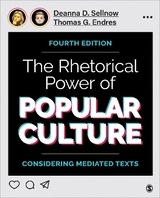
The Rhetorical Power of Popular Culture
SAGE Publications Inc (Verlag)
978-1-5063-1521-8 (ISBN)
- Titel erscheint in neuer Auflage
- Artikel merken
Can television shows like Modern Family, popular music by performers like Taylor Swift, advertisements for products like Samuel Adams beer, and films such as The Hunger Games help us understand rhetorical theory and criticism?
The Third Edition of The Rhetorical Power of Popular Culture offers students a step-by-step introduction to rhetorical theory and criticism by focusing on the powerful role popular culture plays in persuading us as to what to believe and how to behave. In every chapter, students are introduced to rhetorical theories, presented with current examples from popular culture that relate to the theory, and guided through demonstrations about how to describe, interpret, and evaluate popular culture texts through rhetorical analysis. Author Deanna Sellnow also provides sample student essays in every chapter to demonstrate rhetorical criticism in practice. This edition’s easy-to-understand approach and range of popular culture examples help students apply rhetorical theory and criticism to their own lives and assigned work.
Deanna D. Sellnow is a professor of strategic communication in the Nicholson School of Communication and Media at the University of Central Florida. She conducts research in two major areas. The first focuses on strategic instructional communication in a variety of contexts including both in-person and online classrooms, as well as risk, crisis, and health communication contexts. The second focuses on rhetorical studies of popular culture (ranging from music to advertisements to television programs and feature films). She has conducted funded research for the World Health Organization (WHO), the U.S. Geological Survey (USGS), the U.S. Department of Agriculture (USDA), the U.S. Department of Homeland Security (DHS), the National Oceanic and Atmospheric Administration (NOAA), and the U.S. Centers for Disease Control and Prevention (CDC). Her work is published in refereed national and international journals, as well as several books. She has presented her work across the United States and in many countries around the world, including Canada, China, Denmark, Egypt, England, Germany, Hong Kong, India, Indonesia, Ireland, Italy, Japan, Senegal, Singapore, Spain, Sweden, Türkiye, and Vietnam. She and her husband, Tim, have a daughter (Debbie) and son-in-law (Scott), son (Rick) and daughter-in-law (Sarah), and three grandchildren (Lincoln, Emmett, and Rosemary).
Preface
Acknowledgments
CHAPTER 1. WHAT IS POPULAR CULTURE AND WHY STUDY IT?
What Is Popular Culture?
What Are Popular Culture Texts?
Why Study Popular Culture?
Conducting Rhetorical Analyses of Popular Culture Texts
Sample Student Essay
Summary
Challenge
Suggested Readings
References
CHAPTER 2. EXPANDING THE RHETORICAL TRADITION
The Nature of Rhetoric and Rhetorical Criticism
Evolution of the Rhetorical Tradition
The Neo-Aristotelian Approach to Rhetorical Criticism
New (Contemporary and Postmodern) Rhetorical Approaches
Sample Student Essay
Summary
Challenge
Suggested Readings
References
CHAPTER 3. A NARRATIVE PERSPECTIVE
Narration
Narrative Rationality
Conducting a Narrative Analysis
Sample Student Essay
Summary
Challenge
Suggested Readings
References
CHAPTER 4. A DRAMATISTIC PERSPECTIVE
The Dramatistic Life Cycle
Cluster Analysis
The Pentad
Conducting a Dramatistic Analysis
Sample Student Essays
Summary
Challenge
Suggested Readings
References
CHAPTER 5. A SYMBOLIC CONVERGENCE PERSPECTIVE
Fantasy Theme Analysis
Rhetorical Visions, Master Analogues, and Life Cycles
Conducting a Symbolic Convergence Analysis
Sample Analysis
Sample Student Essays
Summary
Challenge
Suggested Readings
References
CHAPTER 6. A NEO-MARXIST PERSPECTIVE
Ideology and Hegemony
Materialism and Economic Metaphors
Sites of Struggle
Conducting a Neo-Marxist Analysis
Sample Student Essays
Summary
Challenge
Suggested Readings
References
CHAPTER 7. FEMINIST PERSPECTIVES
Hegemony
Sites of Struggle
Waves of Feminism
Feminist Perspectives
Conducting a Feminist Analysis
Sample Student Essays
Summary
Challenge
Suggested Readings
References
CHAPTER 8. A MUSIC PERSPECTIVE: THE ILLUSION OF LIFE
Music as Rhetoric
The Illusion of Life
Conducting an Illusion of Life Analysis
Sample Student Essays
Summary
Challenge
Suggested Readings
References
CHAPTER 9. VISUAL PERSPECTIVES
History and Nature of Visual Communication
Visual Theory Perspectives
Visual Pleasure Theory
Conducting a Visual Pleasure Analysis
Sample Student Essay
Summary
Challenge
Suggested Readings
References
CHAPTER 10. MEDIA-CENTERED PERSPECTIVES
Media Ecology Theory
Media Logic
Social Learning Theory
Parasocial Relationship Theory
Cultivation Theory
Conducting an Analysis Using a Media-Centered Perspective
Sample Student Essay
Summary
Challenge
Suggested Readings
References
Appendix. Writing a Popular Culture Rhetorical Essay
Glossary
Index
About the Author
| Erscheinungsdatum | 04.04.2017 |
|---|---|
| Verlagsort | Thousand Oaks |
| Sprache | englisch |
| Maße | 187 x 231 mm |
| Gewicht | 520 g |
| Themenwelt | Geisteswissenschaften ► Philosophie ► Erkenntnistheorie / Wissenschaftstheorie |
| Sozialwissenschaften ► Kommunikation / Medien ► Allgemeines / Lexika | |
| Sozialwissenschaften ► Soziologie | |
| ISBN-10 | 1-5063-1521-6 / 1506315216 |
| ISBN-13 | 978-1-5063-1521-8 / 9781506315218 |
| Zustand | Neuware |
| Haben Sie eine Frage zum Produkt? |
aus dem Bereich



![Was heißt Denken?. Vorlesung Wintersemester 1951/52. [Was bedeutet das alles?] - Martin Heidegger](/media/113619842)